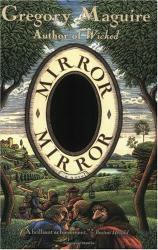Mirror Mirror
Review
Mirror Mirror
Just for a second, forget everything you know about the well-known story of "Snow White and the Seven Dwarves." Forget the animated movie with the singable songs, forget the familiar story line with its happy ending. Instead, imagine a darker tale, filled with political intrigue, doomed quests and dark family secrets. Now you can taste a little of the flavor of Gregory Maguire's new novel MIRROR MIRROR. As he did with his previous novels WICKED (based on THE WIZARD OF OZ and now a Broadway musical) and CONFESSIONS OF AN UGLY STEPSISTER (based on "Cinderella"), Maguire takes the bones of these old, well-known stories and completely reinvents them into well-developed novels that can stand on their own. Maguire has been writing children's fantasy novels for a long time, so it is no surprise that he can skillfully play with elements of classic fantasy and make them into something totally new and often surprising.
But don't think that MIRROR MIRROR and its predecessors are novels for children --- no, these are definitely fairy tales for grown-ups. In MIRROR MIRROR, history and fantasy are intertwined, and two of the main characters are the decadent (and incestuous) Borgia siblings, Cesare and Lucrezia. Near the beginning of the novel, the two pay a visit to the widower Vicente de Nevada and his strikingly lovely daughter Bianca at their villa, Montefiore, tucked in the hills of Tuscany and Umbria. Cesare sends Vicente off on a seemingly hopeless quest for the last remaining branch from the apple tree in the Garden of Eden. The beautiful but vain Lucrezia, her eye always on opportunities for personal advancement, offers to set up residence at Montefiore and keep an eye on Bianca.
Vicente's quest takes years, and eventually he is assumed dead. Soon enough, though, Lucrezia's jealousy of Bianca's looks --- and specifically her resentment of Cesare's attraction to the girl's youthful beauty --- drives her to plot the girl's demise. As you might guess, however, the lovely Bianca survives, and the increasingly desperate Lucrezia is driven to more and more extreme lengths to destroy the girl who is "the fairest one of all."
Maguire's skill in MIRROR MIRROR, as in his previous works, is with playfully reinventing familiar plots with darker themes and characters. Here the dwarves, for example, are not silly slapstick characters but shapeless, nameless stone-like creatures who gradually gain elements of humanity through their interactions with Bianca and their own quest to retrieve the mirror that causes so many problems: "The dwarves had hobbled out of their stony natures partly by accident and somewhat by design. . . . But now they couldn't empty their pockets of memory, of irritation, of regret or conundrum, of paradox or paradise. They were trapped by the laws of their own devising." The transformation of the dwarves is just one of the thought-provoking themes running through the novel.
Character development, however, is not particularly strong in this book or in Maguire's previous fairy tale adaptations. In his earlier novels, Maguire played with characterization by making the reader care about traditionally unsympathetic characters such as the wicked witch or the ugly stepsister. In MIRROR MIRROR, though, the "evil stepmother" figure portrayed by Lucrezia Borgia remains unlikable from start to finish, and her motivations are never adequately explored. Even the character of Bianca is not particularly engaging --- she remains a passive, somewhat lifeless character throughout the novel. Part of the problem is the rate at which Maguire changes narrators --- each brief chapter is told from a different point of view, and just as we settle into one character's voice and vision, we're whisked away to the next.
This narrative technique does make for a brisk and lively reading experience, though, which provides a nice contrast to the sensuous, luxurious descriptions of the Italian countryside. Readers looking for an imaginative, playful reworking of classic tales can't do better than Gregory Maguire's fractured fairy tales, and MIRROR MIRROR continues his strong tradition.
Reviewed by Norah Piehl on January 22, 2011
Mirror Mirror
- Publication Date: September 28, 2004
- Genres: Fiction
- Paperback: 320 pages
- Publisher: Harper Paperbacks
- ISBN-10: 0060988657
- ISBN-13: 9780060987527




